- Home
- Kate DiCamillo
Franklin Endicott and the Third Key Page 2
Franklin Endicott and the Third Key Read online
Page 2
Frank cleared his throat. He said, “I’m amazed at your selection.”
“I try to aim for a certain eclecticism,” said Buddy Lamp. “Many, many things interest me. Many things fascinate me. The world is filled with marvels.”
“Are those eyeballs in that jar?” said Frank.
“That is exactly what they are,” said Buddy Lamp. “They are not real, of course. They belong to a taxidermist. Or rather, they did belong to a taxidermist. Past tense, past tense. So much here involves the past tense. In any case, there are many varieties of artificial eyes in that jar — eye of leopard, eye of squirrel, eye of duck, even eye of newt, perhaps. Who knows?”
The sleigh bells on the door jingled, issuing their promise of merry and carefree days, and Eugenia Lincoln entered the store.
“Mr. Lamp,” said Eugenia. “I’m assuming my duplicate key is ready.”
“It is,” said Buddy Lamp. He clicked his heels together. “Just one moment, please.”
Buddy Lamp went behind the counter and came back with a brown envelope. “Here you are,” he said. “I’m pleased to have been of service.” He handed the envelope to Frank.
Buddy Lamp bowed at Eugenia, and then he bowed at Frank. He said, “I hope to see you both again soon.”
Frank thought it was unlikely that he would ever return to Buddy Lamp’s Used Goods. The store was entirely too disturbing.
Nonetheless, Frank bowed back at Buddy Lamp. He thanked him.
It wasn’t until Eugenia Lincoln turned the car onto Deckawoo Drive that Frank thought to look inside the envelope.
“Uh-oh,” said Frank.
“What now?” said Eugenia.
“There are three keys in here,” said Frank. “And there should be only two.”
The third key was not like the other two keys.
The pattern of its teeth was different. It shone in a muted, self-important way, as if it knew a secret.
“I’m sure that Buddy Lamp put the key in the envelope inadvertently,” said Eugenia Lincoln. “Tomorrow, you may go and return it to him.”
“But what does it mean?” said Frank.
“What does it mean?” said Eugenia. “It means that Buddy Lamp put the key in the envelope by mistake. As I said.”
Frank held the third key in his hand and stared down at it. He did not think the key was a mistake. He thought it was a message. He just didn’t know what the message was.
“I’ll have to go back,” he said.
“As I said,” said Eugenia, “you will return the key tomorrow.”
“But I’m afraid to go back there,” said Frank.
“We have already discussed this, Franklin Endicott. You have entirely too many fears. Tomorrow, you will return the key to Mr. Lamp. And that’s that.”
He had nightmares that night. Of course he did.
He dreamed that the third key was buried in a bowl of eyeballs. He dreamed of the snarl and snap of weasel teeth. He dreamed that the headless mannequin in the green suit could speak — in spite of the fact that it didn’t have a head.
“Give me back my key!” the headless mannequin shouted.
Frank woke with a start. He got up, turned on the light, and went downstairs. He got the worry notebook out of the hall closet. He made several entries: eyeballs (fake), bugs in amber (for all eternity), weasels (their teeth), headless men (talking), and keys (of unexplained origin).
And then he returned the notebook to the top shelf and went into the kitchen and heated up some milk. He looked out the window. The Lincoln sisters’ light was not on. Eugenia was not sitting at the kitchen table.
Frank was all alone in the world.
Eugenia Lincoln was right, of course. He was going to have to return to Buddy Lamp’s Used Goods.
He was going to have to face his fears.
He was going to have to step forward bravely.
The next day, Frank went to Buddy Lamp’s and stared in the window at the weasel and the weasel’s teeth and the headless man. And then he pulled open the door and the sleigh bells rang their merry ring, and Frank went inside.
It was, if possible, even gloomier in Buddy Lamp’s Used Goods than it had been the day before. The wax figure of Napoleon was gone, and in its place was a gigantic book on a wooden stand. The book was opened to a map. Frank stepped closer. He leaned in and studied the map. He did not recognize anything on it, and the words describing the unrecognizable place were in a different language. Even the letters looked strange. It was all very disconcerting.
Frank took a step back, away from the book.
“Hello?” he called out. “Mr. Lamp?”
“Mr. Endicott,” said Buddy Lamp.
“Eeep!” said Frank.
Buddy Lamp had, again, managed to appear out of nowhere.
“Sir!” said Frank. “When you made the key for Miss Lincoln, you put a third key in the envelope by mistake. I’m returning it.”
Frank held out the key. He was embarrassed to see that his hand was trembling.
Buddy Lamp bent over. He lowered his glasses. He stared at the key in Frank’s shaking hand. “Hmmm,” said Buddy Lamp. “Humdee dum dee.” He raised his glasses. He stood up straight. He said, “I’ve never seen that key before.”
“What?” said Frank. “That can’t be. This key was in the envelope. You must have put it there.”
“But I didn’t put it there,” said Buddy Lamp. He smiled his ghostly smile.
“How did it get in there then?” said Frank. He felt dizzy. “There has to be an explanation.”
“Does there?” said Buddy Lamp. “In my experience, things happen all the time that can’t be explained.”
“Can you please take this key back?”
“I’m afraid I can’t,” said Buddy Lamp.
“Why not?” said Frank.
“Because,” said Buddy Lamp. He smiled. “It’s not my key.”
“I don’t know what to do,” said Frank. “I’m confused and afraid.”
“Ah,” said Buddy Lamp. “I think have the solution for that.”
“You do?” said Frank.
“Yes,” said Buddy Lamp.
“What is it?”
“Hot chocolate,” said Buddy Lamp.
Buddy Lamp made hot chocolate by first heating milk on a little two-burner stove. Why, Frank wondered, did people believe so ardently in the heating up of milk? Why did they think it was a solution for anything?
Buddy Lamp’s stove was on a table behind the counter, and on either side of the table were pink chairs. Both chairs had stuffing poking out of them.
“Please,” said Buddy Lamp. “Have a seat.”
Frank sat down. He still had hold of the third key.
“Now,” said Buddy Lamp. “I will just heat this milk to the proper temperature and melt the chocolate into it and it will be sweet and good. Then we can drink it together and talk of things that matter.”
“Like where this key came from?” said Frank.
“Ha-ha-ha and humdee dum dee,” said Buddy Lamp. He dropped chunks of chocolate into the milk. “The key is a mystery. You have been given the gift of a mystery. Isn’t that wonderful? Who knows what doors it may unlock? It’s like a story from our friend O. Henry.”
As far as Frank knew, he didn’t have a friend named O. Henry.
Also, he didn’t think that mysteries were gifts at all.
Buddy Lamp carefully poured the hot chocolate into two china teacups. He handed a cup to Frank, and then he sank down in his chair and crossed his left leg over his right leg. He took a sip of his hot chocolate. He sighed.
Frank put the key on the table between them.
Outside, from far away, came the sound of thunder. And then there was rain, pattering on the roof of Buddy Lamp’s Used Goods.
“Who’s O. Henry?” said Frank.
“Tsk,” said Buddy Lamp. He put down his teacup. He slowly unfolded himself, got up out of the chair, and disappeared into the confines of the store. When he returned, he had a
book in his hands.
He handed the book to Frank and sat down again.
“A Collection of Short Stories Certain to Entertain, Inspire, and Delight,” Frank read aloud.
“You’ll find a story by O. Henry in there,” said Buddy Lamp. “O. Henry is a fabricated name, a pen name, a nom de plume. You can do that, you know: name yourself whatever you please, even if you’re not a writer. Take, for example, the name Buddy Lamp. My father was named Buddy Lamp, and his father before him. But it’s a fabricated name, entirely fabricated, born of longing.”
“Oh,” said Frank.
“Yes,” said Buddy Lamp. “It’s an interesting story, how the name Buddy Lamp came about. Would you like to hear it?”
“I guess so,” said Frank. “And then maybe you can tell me where the third key came from.”
“So,” said Buddy Lamp, “my grandfather came to this country from Italy. He came on his own. He was only fifteen years old. And when he got off the boat and had to announce his name to the authorities, my grandfather thought, I am entirely alone in the world. I can become whoever I want to become. I can name myself whatever name I choose. He said to the man standing next to him in line, ‘I would like a name full of light.’ And the man beside him said, ‘Yeah? Well, turn yourself into a lamp then, buddy.’ So that is what my grandfather did. He turned himself into Buddy Lamp.”
“That’s a good story,” said Frank. He took a sip of hot chocolate. He looked over at the third key.
“Good stories help,” said Buddy Lamp, “don’t they?”
“With what?” said Frank.
“With everything,” said Buddy Lamp. “When I was a boy and I couldn’t sleep, when the world seemed blustery and unbearably sad, my father would make hot chocolate for me. And then he would sit beside me and read me a story. Are you unbearably sad?”
“I think I’m unbearably worried,” said Frank.
“Well,” said Buddy Lamp, “stories are good for that, too.”
“I’m not much for stories,” said Frank. “I prefer a factual account of things. I like to know as many facts as possible.”
“Yes,” said Buddy Lamp. “I see. Well, stories are factual accounts of the human heart. If you hand me that volume, I will demonstrate.”
Frank gave Buddy Lamp the book. He watched him flip through the pages until he came to a story called “The Last Leaf” by O. Henry.
“And so,” said Buddy Lamp. He adjusted his glasses. He cleared his throat, and then he read Frank a story about two artists who shared an apartment. The artists were poor and it was winter and one of them got very sick, and she decided that she would die as soon as the last leaf fell from a vine outside the window of their apartment. But something surprising happened: the last leaf never fell. No matter how hard the wind blew, the last leaf did not fall. It never fell. And the artist did not die.
Frank sat in the pink chair and held his hot chocolate and listened to Buddy Lamp read. He forgot about the third key and the book of worries and unsolvable mysteries.
“So,” said Buddy Lamp when he had finished reading. “You see how things go in stories — how can they surprise you, how things happen that you do not at all anticipate. Maybe that is how it is with your key. Maybe something will happen that you do not expect at all.”
Buddy Lamp closed the book and handed it to Frank.
“Take that with you,” he said. “Share its contents with someone else. Make a little light.” He stood and gave a little bow and then turned toward the window. “I see that it’s raining outside. I have an umbrella that you can borrow. And please, do not leave without your mysterious key.”
Frank left Buddy Lamp’s with A Collection of Short Stories Certain to Entertain, Inspire, and Delight under his arm, the third key in his pocket, and an umbrella over his head. The umbrella had a vulture carved into its handle, and normally Frank would not have wanted to carry a vulture umbrella (vultures were very disturbing birds), but he was distracted.
The whole way home, Frank thought about the O. Henry story. He thought about the last leaf and why it was that it never fell. He thought about all the ways that people can surprise each other. He felt warm inside. It was probably the hot chocolate, but maybe it was the story, too.
“Humdee dum dee,” said Frank out loud. And then he said it again, “Humdee dum dee.”
When Frank got home, he found Stella’s friend Horace Broom sitting at the kitchen table with Stella. They were working together on constructing a model of the galaxy. They were arguing about what color to paint the planets.
Mercy Watson was under the kitchen table. She had her chin on Stella’s foot. She was asleep, and snoring.
“I think that Jupiter should be green,” said Stella.
“But it’s not green!” said Horace. “Jupiter is not a green planet.”
“I didn’t say that it was,” said Stella. “I’m just saying that I think it would look very good green. It would kind of make the whole galaxy look better, zippier.”
“We’re not making art; we’re making the galaxy,” said Horace Broom. “And we have to do it right.”
Stella looked up at Frank. She said, “Where you have you been, Frank?”
Frank said, “I was at a place called Buddy Lamp’s Used Goods. I went with Miss Lincoln to get a key duplicated, and when Mr. Lamp gave me the key and its duplicate back, there was a third key in the envelope. This key.” He took the key out of his pocket and held it out so that Stella and Horace could see it. “But Mr. Lamp says he did not put this key in the envelope. He says he’s never seen it before. It’s a mystery.”
“Oooh,” said Stella. “What if the key opens a treasure chest? And what if the treasure chest is full of gold doubloons?”
“There aren’t doubloons anymore,” said Horace. “All the doubloons have been discovered.”
“How do you know they’ve all been discovered?” said Stella.
“I think that the key opens the door to a prison where someone has been locked away for years and years,” said Horace Broom. He scratched his head. “I think that this is the key that frees someone.”
The three of them studied the key in Frank’s hand.
Mercy Watson woke up. She came to stand with them. She stared at the key, too. She narrowed her eyes.
“Mercy thinks it’s something to eat,” said Stella.
“Ha,” said Horace Broom. “Pigs.”
Mercy leaned forward and snuffled the key. Her snout tickled Frank’s fingers. He laughed.
And then, without any warning at all, Mercy Watson sucked up the key and swallowed it.
“She ate the key!” shouted Frank. “Mercy ate the key!”
“Do the Heimlich maneuver!” Horace shouted back.
“Why?” said Stella. “She’s not choking.”
And it was true. The pig was not choking. She was standing and staring off into the distance with a benign, if somewhat disappointed, look on her face.
“Well,” said Horace. “I guess that takes care of the key mystery.”
“Good grief,” said Frank. “What if it kills her?”
“She’s fine,” said Stella. “She can eat anything.”
“Pigs have got great digestive tracts,” said Horace Broom.
“Good grief,” said Frank again.
The warm feeling, the peaceful feeling, the humdee-dum-dee feeling that he had experienced on his walk home from Buddy Lamp’s Used Goods, had disappeared entirely. In its place was a familiar sense of dread.
Frank went and got his worry notebook out of the hall closet. He went up to his room and sat down at his desk. He opened the notebook, and then he realized he didn’t even know where to start. Should he write down mysterious keys as a worry? Should he list pigs swallowing keys as a concern?
He closed the notebook. He felt a sudden, desperate need to consult the Bingham Lincoln Encyclopedia set. He went downstairs.
He heard Horace Broom say, “Fine. Paint Jupiter green.”
He heard Stel
la say, “I think you’ve made an excellent decision. It will look very zippy.”
He heard Mercy Watson burp.
Frank went out the door and across the rain-spangled lawn. The sun was coming out. He knocked on the Lincoln sisters’ door, and Eugenia Lincoln welcomed him inside. She afforded him carte blanche with the encyclopedias and told him to put everything back where he found it. Frank went and sat in the living room and stared at the books.
He truly didn’t know where to begin.
Should he look under key?
Mystery?
Digestive tract?
Humdee dum dee?
After a while, Frank got up and went home, without having removed a single Bingham Lincoln Encyclopedia from the shelf.
That night, Frank had nightmares. He dreamed about Mercy Watson coughing up eyeballs. He dreamed of a vulture flying over his head, following him. He dreamed that he was looking for something and could not find it. It was exhausting — to look for something and never find it.
When he woke up, he went downstairs and warmed up some milk — although he was beginning to doubt the efficacy of warm milk, and of hot chocolate, too. Truthfully, he was starting to doubt everything. It was a terrible feeling.
He saw that the Lincolns’ kitchen light was on. Eugenia Lincoln was sitting at the kitchen table. She looked lonely and unbearably sad.
Frank went upstairs and retrieved A Collection of Short Stories Certain to Entertain, Inspire, and Delight. He wrote another note to his family (Do not worry. I have just gone next door. Love, Frank) and then he took two mugs of warm milk, walked over to the Lincoln sisters’ house, and called out, “It’s me, Miss Lincoln. Franklin Endicott. Could you open the door? I’ve got my hands rather full here.”
Eugenia Lincoln opened the door.
Frank said, “I made you some hot milk with cinnamon and honey, Miss Lincoln. And I thought you might want to know that I took the key back to Mr. Lamp and he said that it wasn’t his, that he had never seen it before, and that he didn’t know how it had gotten into the envelope. He says that it’s a mystery. And that mysteries are gifts.”

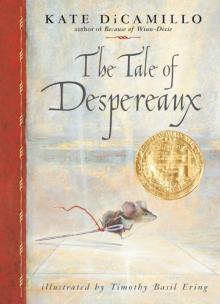 The Tale of Despereaux
The Tale of Despereaux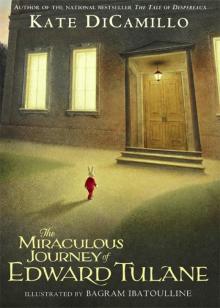 The Miraculous Journey of Edward Tulane
The Miraculous Journey of Edward Tulane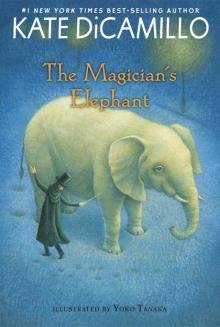 The Magician's Elephant
The Magician's Elephant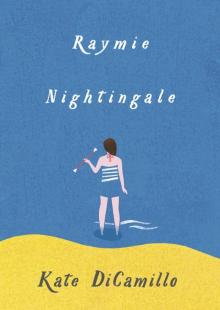 Raymie Nightingale
Raymie Nightingale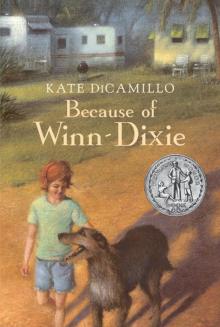 Because of Winn-Dixie
Because of Winn-Dixie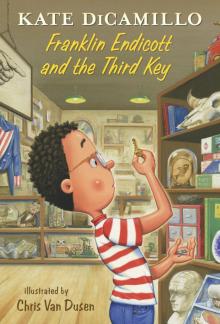 Franklin Endicott and the Third Key
Franklin Endicott and the Third Key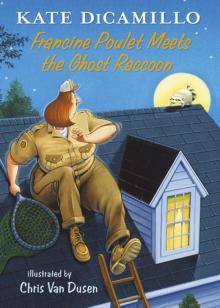 Francine Poulet Meets the Ghost Raccoon
Francine Poulet Meets the Ghost Raccoon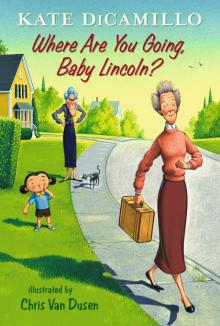 Where Are You Going, Baby Lincoln?
Where Are You Going, Baby Lincoln?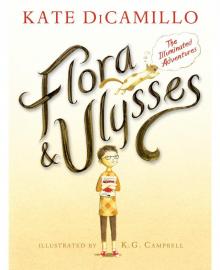 Flora & Ulysses: The Illuminated Adventures
Flora & Ulysses: The Illuminated Adventures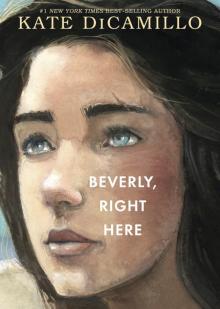 Beverly, Right Here
Beverly, Right Here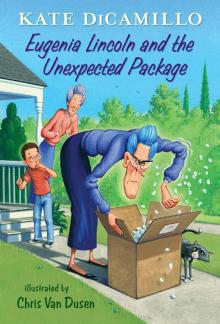 Eugenia Lincoln and the Unexpected Package
Eugenia Lincoln and the Unexpected Package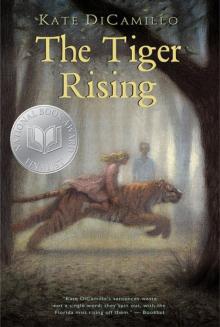 The Tiger Rising
The Tiger Rising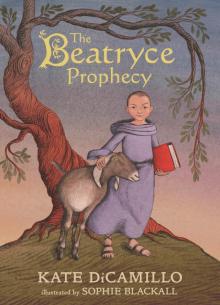 The Beatryce Prophecy
The Beatryce Prophecy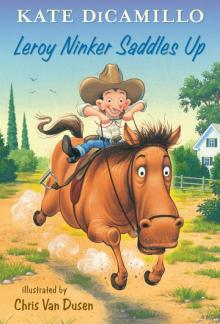 Leroy Ninker Saddles Up
Leroy Ninker Saddles Up